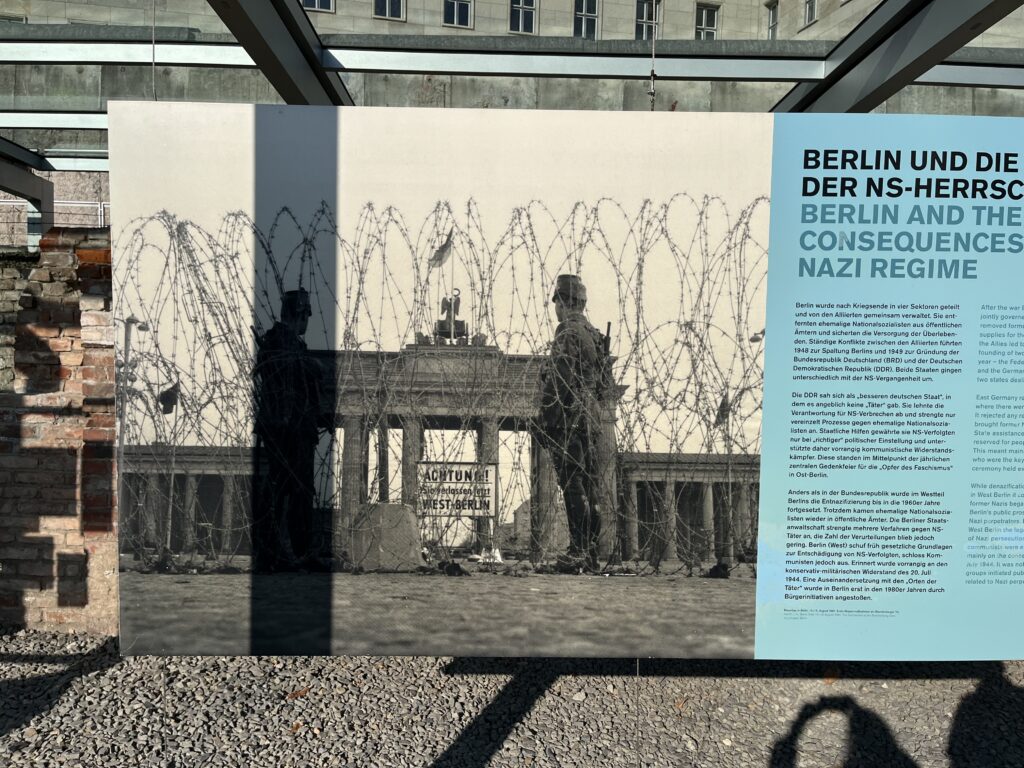Thoughts intersect as do prayers. My prayer today is to be more skillful in connecting the lessons learned in Berlin while volunteering. Psalm 5:3 reads, “Listen to my voice in the morning, Lord. Each morning I bring my requests to you and wait expectantly”. I’m asking God to help me write only what has purpose that He approves of. I have mentioned turning a corner in a museum to find Dietrich Bonhoeffer in a snapshot with other prisoners. To focus on sharing biblical insights while fearing incarceration, and then to write in secret while incarcerated is beyond my understanding. Did he complain? I want to connect spiritual insights on the battle for the minds of men, along with my Berlin experience as I read through Bonhoeffer’s books, beginning with ‘Ethics‘. I often think I can do things that are beyond me so let’s begin. The Berlin I recently visited was so different from 46 years ago when the wall was still up. There has been recovery and levels of healing but it is still a dark place with a tortured history. When you are in places like this you can lose your peace – temporarily. Without peace I think we self-medicate. I think of coffee, chocolate, and tv. I’m not miserable but life is harder without peace. It’s like a sports injury – you walk funny for a few days. In 1939 Bonhoeffer wrote “The Church and the World” along with these two verses, Matt 12:30 and Mark 9:40, on the margins of a calendar. In the preface to ‘Ethics’ , titled, Stations on the Way To Freedom, his plan is Self-discipline, Action, Suffering, and Death. In summary, he wrote, “Do and dare what is right”. “See what a transformation! These hands so active and powerful now are tied, and alone and fainting, you see where your work ends. Yet you are confident still, and gladly commit what is rightful into a stronger hand, and say that you are contented. You were free from a moment of bliss, then you yielded your freedom into the hand of God, that he might perfect it in glory”. About death he writes, “Come now, highest of feasts on the way to freedom eternal, death, strike off the fetters, break down the walls that oppress us, our bedazzled soul and our ephemeral body, that we may see at last the sight which here was not vouchsafed us. Freedom, we sought you long in discipline, action, suffering, now as we die we see you and know you at last, face to face”. I can hardly believe that Bonhoeffer used his time to learn that death is not the most fearful thing. Did he have a sense that his time would be short? Many of his thoughts in ‘Ethics’ evolve from the truth that man at his origin knows only one thing: God. As soon as the garden event concludes, man knows a lot of things that have corrupted the human race. “Originally man was made in the image of God, but now his likeness to God is a stolen one. As the image of God man draws his life entirely from his origin in God, but the man who has become like God has forgotten how he was at his origin and has made himself his own creator and judge”. It is like we have layers of God’s image and we thin them out day after day, layer after layer. We have lost the shininess. We become less of His image. How God saves us is/was His secret but we stole it. The messages about us point to a million other salvations. The million plus one will be discovered tomorrow because the devil is at work. Man himself desires to choose. He writes, “Man knows good and evil, against God, against his origin, godlessly and of his own choice, understanding himself according to his own contrary possibilities; and he is cut off from the unifying, reconciling life in God, and is delivered over to death”. He also writes about the grief we live with because of our estrangement from God and that is the root to all of our shame. This shame can only be overcome when the original unity is restored – salvation. We try to be good but we can’t. We are people of disunion. To finish up today he says, “The crucial point about all these arguments is that Jesus does not allow Himself to be drawn in into a single one of these conflicts and decisions. With each of His answers He simply leaves the case of conflict beneath Him”. Bonhoeffer is referring to the many conversations Jesus had with the Scribes, Pharisees, and others. Jesus always rose above conflict and disunity with truth. Amazing. I’ll call this the Pharisee Game and they always lost. Psalm 8:4-6 reads, “What are mere mortals that you should think about them, human beings that you should care for them? Yet you made them only a little lower than God and crowned them with glory and honor. You gave them charge of everything you made, putting all things under their authority–“. What are we doing?

